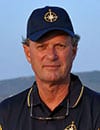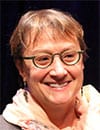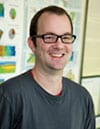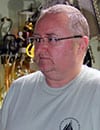Life without Sunlight at Deep-sea Hot Springs
Sunday, August 27, 2017 6-8:00 p.m.
Lillie Auditorium
7 MBL Street, Woods Hole, MA
Keynote Presentation
Discovery of Deep-Sea Hot Springs
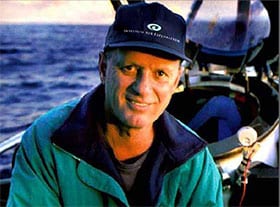
Founder and President of the Ocean Exploration Trust, Director of the Center for Ocean Exploration and Professor of Oceanography at the University of Rhode Island Graduate School of Oceanography
» View Video
(Due to technical difficulties, the presentation picks up a few minutes after it starts.)
Panel Discussion
Implications for Life on Earth and Elsewhere
Panelists
Dr. Robert Ballard
Ocean Exploration Trust
Robert Ballard is Founder and President of the Ocean Exploration Trust; Director of the Center for Ocean Exploration and Professor of Oceanography at the University of Rhode Island Graduate School of Oceanography. He is an Explorer-In-Residence at the National Geographic Society, Commissioner for the U.S. Commission on Ocean Policy, and a Senior Scientist Emeritus at the Woods Hole Oceanographic Institution.
He served in the U.S. Navy for more than 30 years and continues to work with the Office of Naval Research. A pioneer in the development of deep-sea submersibles and remotely operated vehicle systems, he has taken part in more than 150 deep-sea expeditions. In 1985, he discovered the RMS Titanic, and has succeeded in tracking down numerous other significant shipwrecks, including the German battleship Bismarck, the lost fleet of Guadalcanal, the U.S. aircraft carrier Yorktown, and John F. Kennedy’s boat, PT-109. He has also discovered hydrothermal vents and “black smokers” in the Galapagos Rift and East Pacific Rise in 1977 and 1979. The author of numerous books, scientific papers, and articles, he has been featured in several National Geographic television programs, including “Secrets of the Titanic” and a more recent five-part mini-series, “Alien Deep with Bob Ballard.” He was a special advisor to Steve Spielberg on the futuristic television show seaQuest DSV. His honors include 21 Honorary Doctorates, National Geographic’s highest award, the Hubbard Medal, and a National Endowment for the Humanities Medal. He was elected a Fellow of the American Academy of Arts and Sciences in 2014.
Dr. Mary Voytek
Science Mission Directorate, NASA
Dr. Mary A. Voytek is the Senior Scientist for Astrobiology in the Science Mission Directorate at NASA HQ. She is the founding Director of NExSS, The Nexus for Exoplanet System Science, a NASA research coordination network dedicated to the study of planetary habitability.
Dr. Voytek came to NASA from the U.S. Geological Survey in Reston, VA, where she headed the USGS Microbiology and Molecular Ecology Laboratory. She has degrees in Biochemistry, Biology and Ocean Sciences. Dr. Voytek’s primary research interest is aquatic microbial ecology and biogeochemistry and has worked in several extreme environments including Antarctica, the arctic, hypersaline lakes, deep-sea hydrothermal vents, and terrestrial deep- subsurface sites (the Chesapeake Impact Crater). She has held positions in several science societies, served on several advisory groups to Department of the Interior, Department of Energy, the National Science Foundation and NASA, including the Planetary Protection Subcommittee, and serves as a NASA representative to a number of international groups exploring the potential for life in the universe.
Dr. Frieder Klein
Woods Hole Oceanographic Institution, Woods Hole, MA
Frieder Klein's research focuses on seafloor hydrothermal systems. Trained as a petrologist and geochemist, Klein studies the interactions between rocks and aqueous solutions in a range of geological settings.
He uses field observations, hydrothermal laboratory experiments, analytical chemistry, and thermodynamic modeling to examine the fundamental processes that regulate the consumption and formation of chemical compounds, such as carbon dioxide, hydrogen and methane. Microorganisms can use these compounds as nutrients and sources of energy in extreme environments, such as Earth's interior. Klein's research has implications for our understanding of hydrothermal systems on early Earth and the icy moons of Jupiter and Saturn. Klein received his Ph.D. in Geosciences from the University of Bremen (Germany) in 2009 and was awarded a postdoctoral scholarship from the Woods Hole Oceanographic Institution, where he is now a scientist in the Department of Marine Chemistry and Geochemistry Department.
Dr. Christopher Glein
Space Science and Engineering Division, Southwest Research Institute, San Antonio, TX
Chris Glein is a research scientist at Southwest Research Institute, San Antonio. He received a BS in Chemistry from the University of Washington (2006), and a PhD in Geological Sciences from Arizona State University (2012).
His graduate research focused on theoretical studies of geochemical processes on Saturn’s moons Enceladus and Titan, as well as the reactivity of organic acids in hydrothermal fluids via experiments. He did postdocs at the Geophysical Laboratory and the University of Toronto, where he gained additional expertise in high pressure-temperature experimentation and stable isotope geochemistry, respectively. He moved to Southwest Research Institute in 2015. Currently, he is a member of the science teams for the Cassini-Huygens, Rosetta, and Europa Clipper missions. His research interests include origins of volatile inventories on outer planetary bodies, compositions of alien oceans, and the habitability of outer planetary satellites.
Dr. Christopher German
Woods Hole Oceanographic Institution, Woods Hole, MA
Chris German is a specialist in exploring deep oceans for sites of seafloor fluid flow and the unusual life that might be found there. Educated at the University of Cambridge in the UK, he first spent time at WHOI when he was a post-doctoral research fellow at MIT in the late 1980s.
But after 15 years back working as a full time ocean scientist for the UK Government, he returned to WHOI permanently in 2005, first as Chief Scientist for Deep Submergence and now back to full time research, specializing in the use of advanced technologies for exploring extreme environments. During the Census of Marine Life decade (2000-10), he pioneered the use of autonomous underwater vehicles to locate and characterize vents in previously unexplored ocean basins. Having achieved a complete set, with the discovery of black smokers in the Arctic in 2014, he is now turning his attention beyond Earth.
Moderated by Mindy Todd, host of "The Point," WCAI, Cape & Islands NPR.

